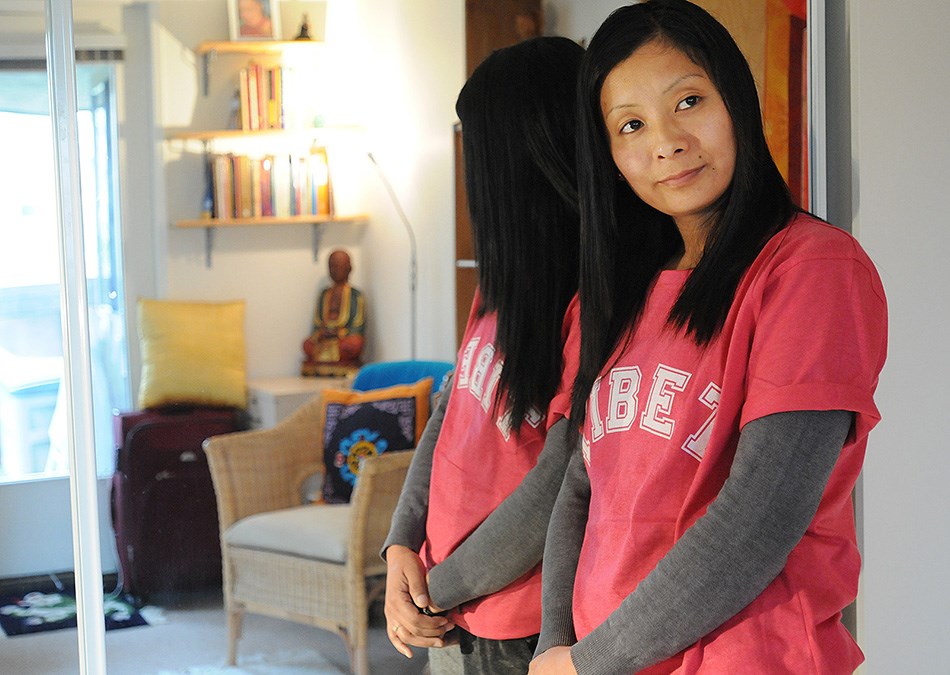Kelsang Choden shifted nervously in her chair, her eyes darting towards her sponsor sitting nearby. “I’m hoping to become a nurse,” she said, when asked what her dreams are for her life in Canada. Beyond that, the 34-year-old Tibetan didn’t know what to say. She’d only been in Canada for five days and everything felt very new to her as she sat around a living room table in a quaint Kitsilano apartment.
“I’ll achieve this goal, then think about it,” she laughed, feeling more at ease after her sponsor cheerfully encouraged her on.
Choden is one of 21 Tibetan refugees, or displaced persons, who arrived in Vancouver on Dec. 14 as part of the Tibetan Resettlement Program. The program was initiated in 2007 when Tibet’s exiled spiritual leader, the Dalai Lama, asked Prime Minister Stephen
Harper to consider providing permanent homes in Canada for displaced Tibetans living in India.
In 2010 the federal government approved the plan, and the Project Tibet Society was formed to oversee the resettlement process of up to 1,000 Tibetans from the Arunachal Pradesh state of India.
The group that arrived in December is the first of up to 200 Tibetans who will settle in British Columbia by 2016. Citizenship and Immigrations Canada give the displaced Tibetans permanent residency status upon arrival but all other support comes from sponsors, explained Ray Yee, a member of the Project Tibet Society and a sponsor.
Each Tibetan family or individual has to be sponsored by an organization or a group of five Canadian citizens, who share the work of helping the Tibetans with accommodation and transit needs, English training, job searching, and all other daily requirements. The sponsorship is limited to a year to encourage the Tibetans to become independent.
“It’s a fascinating experience because you are both helping them in a very practical way with resources and funding and so on, but you’re also to be a mentor, to get them on their own two feet and become independent,” Yee said.
Yee said that coming to Canada is a fresh start for the displaced Tibetans, who have a difficult life in Arunachal Pradesh. Despite being born in India, they cannot become citizens and cannot own property.
Choden, who has also worked as a nurse in Delhi, was working in a clothing shop in the small mountain town of Bomdila before she came to Canada. She said she often experienced discrimination there. “Some of the local people sometimes they will make problem for us. They come to our shops, they’ll take things, and they won’t pay. They’ll say, ‘You’re refugees.’ They just take things and go. We cannot argue with them.”
One experience several years ago stands out in her memory. “These local people made us close our shops, for nearly four months, and they go on shouting ‘Refugee go back, refugee go back.’”
Shenpenn Khymsar, a Tibetan activist and filmmaker who works with the Project Tibet Society, said the project gives the displaced Tibetans new opportunities. He said the majority that arrived are individuals between the ages of 18 and 45, and 75 per cent of them speak functional English.
This program is a jumpstart that Khymsar, now a Canadian citizen, didn’t have when he arrived in the U.S. as a refugee nearly 20 years ago with no one to welcome or support him.""I could sense this in this one little boy,” said Khymsar, referring to one of the Tibetans he welcomed at the airport. “He had so much wonder in his eyes. I could tell, 20 years from now, he’s going to look back and have an amazing story, because he came here as a refugee with nothing and nobody knows him, but we were there to pick him up and receive him.”
info@gavinfisher.ca
twitter.com/fisher_gavin



